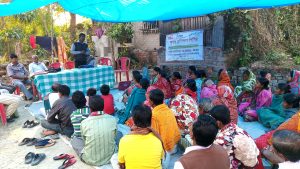Food Legumes Highlights 2020
FOOD LEGUMES RESEARCH IN 2020
ICARDA implemented numerous research projects in 2020 to deliver climate-smart food legumes for family farmers in dry areas to increase their income and household nutrition. ICARDA improves the productivity, nutritional quality, and yield stability of legume crops such as faba bean, grasspea, kabuli chickpea and lentil by developing elite germplasm, resistant to key diseases and insect pests and adaptive to rising temperatures, and water stress. We also look at ways to intercrop these varieties into staple crop systems such as wheat, barley and rice.

Our elite food legume lines are made available to the National Agricultural Research System partners through ICARDA’s International Nurseries. ICARDA’s food legumes team is also working alongside other CGIAR centers to develop the One CGIAR Initiatives that seek to unify efforts in crop improvement globally and across CWANA.
Our projects receive funding from the Indian Council of Agricultural Research (ICAR), the Government of Odisha, the International Fund for Agricultural Development (IFAD), the European Union (EU), the CGIAR Research Program on Grain Legumes and Dryland Cereals (CRP-GLDC), the Grains Research and Development Corporation (GRDC), the Global Crop Diversity Trust, the Arab Fund for Economic & Social Development (AFESD), and the Organization of the Petroleum Exporting Countries Fund for International Development (OFID and Templeton World Charity Foundation, among others.
Climate Smart Food Legumes
One such project, led by Dr. Shiv Kumar, is the INCREASE project within the EU-funded Horizon 2020 project, through which ICARDA and a consortium of 25 partners develop collections of chickpea and lentil to generate important genetic and genomic resources for accelerating the genetic gains in these crops. The EU also funded research led by Dr. Fouad Maalouf which identified ideal ratios for faba bean/wheat intercropping systems. Through Global Crop Diversity Trust-funded research, Dr. Kumar also identified six high-yielding, nutritious lines of lentils. He was also elected Chair of the Scientific Program Committee of the International Food Legume Research Conference to be held in Kenya in 2022.
In Egypt in 2020, ICARDA, through Dr. Aladdin Hamweih, led a global Ascochyta blight (AB) consortium to gain a better global understanding of AB diversity in chickpea, and develop ways to combat it. Dr. Hamweih also continued his food legume research focusing on disease resistance as well as climate-smart traits.
Crop diversification for better soil and yields
The food legumes variety, technology, and seed systems strengthening project in Odisha (India) led by Dr. Ashutosh Sarker and Dr. Nigamananda Swain with funding from the Department of Agriculture & Food Production, Government of Odisha, involved 1115 farmers and produced quality seeds for further farmer outreach, along with demonstrations good agriculture practices in pulses to improve average productivity.
Dr. Habib Halila leads an OFID/AFESD funded crop diversification project across MENA that examines the potential of intercropping food legumes with staple crops such as wheat. In 2020 it expanded to other agro-ecologies and supported national research institutions in scaling the innovations outwards.
Projects led by Drs. Ashutosh Sarker and Nigamananda Swain also looked at intercropping faba bean, grass pea, Kabuli chickpea, and lentil into rice fallow, durum wheat, and barley systems and examined the use of remote sensing images to identify suitable fallows for such diversified crop systems.
We also develop early maturing food legumes to fit within short maturing windows, and for a project in South Asia funded by IFAD and led by Ashutosh Sarker, our early-maturing lentils used between rice harvests increased system productivity by 25-30% where adopted, for over 23,845 farmers.
Safer Grass Pea
And with the support of the Crop Trust and the Templeton World Charity Foundation, and in partnership with the John Innes Center, we generated the genomic resources required to deliver varieties of grass pea with low ODAP (a natural toxin) accurately and efficiently, to make this hardy and nutritious crop safe for human consumption. Research by Dr. Zewdie Bishaw also identified grass pea mutants with low ODAP (a natural toxin) that were suitable and safe options for farmers.
